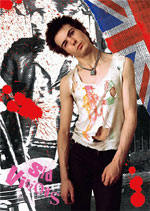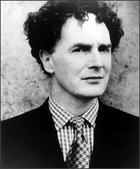Since its inception more than a quarter century ago, punk rock has been
an enormous and integral part of popular music. Many of punk’s
progenitors considered themselves social outcasts, excluded from
mainstream society. Despite their somewhat anti-social beliefs, punk
musicians soon found legions of followers, who emulated the early punks’
style of dress, speech, and ideology, thus spawning a unique, separate
subculture complete with its own collective identity. Two factors
contributed to the creation of a collective punk identity. The first was
punk music itself. In lyrics that were often angry and spiteful, the
disillusioned children of the Vietnam era found sentiments to which they
could relate and slogans with which they could sing along. The second
key factor in the creation of punk’s collective identity stemmed from
simple imitation of the musicians themselves. Legions of fans came to
follow in the footsteps of punk musicians, copying their styles of
dress, their hairstyles, and their views.
The punks were the children of the Vietnam era. A decade of war,
credibility gaps, and White House scandal left the punks with a strong
sense of animosity and distrust for the government. Coupled with a
declining economy, the social situation in America was ripe for the
birth of punk. At the same time the necessary prerequisites for the
British punk scene were developing as well. England, like America, was
in a fierce economic slump, following World War II and the subsequent
collapse of the British Empire. Without her imperial holdings, the
United Kingdom’s economy was stuck in a sharp rut, and the immigration
influx that followed in the wake of decolonization only furthered Great
Britain’s economic woes. Under such harsh conditions, both the American
and British youth held a bleak outlook on the future. Punk rose amidst
this social and economic depression, with three acts rising to
prominence in the punk scene. The Ramones, the Sex Pistols, and the
Clash are arguably the three most influential punk bands, both in terms
of influencing each other and influencing the creation of a collective
punk identity.
The Ramones, the only American act out of the three, were the pioneers.
The first band to truly embody all of the punk characteristics, the
Ramones wrote bizarre, random songs. Their musical style was angry and
blisteringly fast, and their lyrics often contained references to drugs
or similarly offensive material. “No I Wanna Sniff Some Glue” and “I
Wanna Be Sedated” both reference drug use, which was becoming
increasingly common among the youth of America. As such, listeners could
relate to the Ramones’ lyrics, sympathizing with them. In addition to
relating to drug use, punks were awed by the Ramones’ flagrant disregard
for societal norms. Many of their songs contained both blatant and
subtle references to offensive groups like the Nazi Party and the KKK.
“The KKK Took My Baby Away” is among the most blatant of these offensive
songs, but the title of “Blitzkrieg Bop” refers to the chief Nazi
strategy early in the Second World War. The Ramones disciples engaged in
similar behavior, like the Ramones, they did it not out of any real
hatred or sympathy with hate groups, but instead a desire to shock and
offend, a desire to be noticed by a society that ignored them.
The Clash and the Sex Pistols also sang songs that people could relate
to. The Sex Pistols’ lyrics were laced with scorn and angry at the
government. They sarcastically sang “God Save The Queen,” which
sarcastically and scathingly criticizes the British government,
satirizing the original “God Save The Queen” which is a patriotic
anthem. Like the Ramones, the Sex Pistols also worked to be offensive;
in “Anarchy in the U.K.” Johnny Rotten screams that he is “an
anti-Christ” – a particularly offensive statement to the largely
Christian English.
On the other hand, the Clash, though they emerged from the same scene as
the Sex Pistols, espoused lyrics that were, at most, only mildly
offensive. Instead, the Clash were separated not only by their far
superior musicianship (for they were one of the only punk bands to be
made up of talented musicians), but also by the left-wing politics they
advocated with their lyrics. The Clash sang about all of the economic
and social problems facing not only Britain, but often the entire world.
In “White Riot,” the Clash’s first single, Strummer shouts, “black man
got a lotta problems, but they don’t mind throwin’ a brick…too chicken
to try it.” Strummer continued to urge revolt against the government’s
poor treatment of the working class, both black and white. In “Guns of
Brixton” he attempts to incite armed resistance to the brutality
demonstrated by police. In “Remote Control” the Clash question
government authority, asking “Who needs remote control from Civic Hall?”
As the economic slump in Britain continued to deepen, and racial
tensions continued to rise, the Clash’s lyrics were poignant reminders
to the British people of the flaws in their society. Listeners flocked
to the Clash’s punk banner, for the Clash promoted ideas with which they
could agree.
 In addition to commiserating with their audiences through their lyrics,
punks helped form a punk subculture purely by example. Due, to some
extent, to the brilliant managing of entrepreneur Malcolm McClaren, a
clothing store owner, the punks, particularly the Sex Pistols, set
fashion trends, and created a fad. The Ramones dressed like
nineteen-fifties tough guys, with leather jackets, white shirts, and
tight jeans. The Sex Pistols followed suit, with the same tough,
hard-edge look. The punks ripped their clothes and wore spiked and
colored hairdos. They wore offensive symbols on their clothing, like
swastikas, or other white-power symbols. The styles the punks adopted
were designed to completely and totally emulate their musician-idols.
Everything about the punks’ style stemmed from a desire to offend and to
be noticed. The punks were members of a generation that had been all but
forgotten by their governments, who were too busy trying to rectify old
mistakes and attempting to prevent war aboard that they failed to notice
the plight of their own citizens.
In addition to commiserating with their audiences through their lyrics,
punks helped form a punk subculture purely by example. Due, to some
extent, to the brilliant managing of entrepreneur Malcolm McClaren, a
clothing store owner, the punks, particularly the Sex Pistols, set
fashion trends, and created a fad. The Ramones dressed like
nineteen-fifties tough guys, with leather jackets, white shirts, and
tight jeans. The Sex Pistols followed suit, with the same tough,
hard-edge look. The punks ripped their clothes and wore spiked and
colored hairdos. They wore offensive symbols on their clothing, like
swastikas, or other white-power symbols. The styles the punks adopted
were designed to completely and totally emulate their musician-idols.
Everything about the punks’ style stemmed from a desire to offend and to
be noticed. The punks were members of a generation that had been all but
forgotten by their governments, who were too busy trying to rectify old
mistakes and attempting to prevent war aboard that they failed to notice
the plight of their own citizens.
The ease with which the punks adopted their heroes’ styles was due in
part to a sense of solidarity with the punk bands, and in part to
extremely savvy promotion by managers and record company executives,
most notably Malcolm McClaren. The owner of a store called SEX, which
specialized in a variety of leather products, including myriad fetish
wear, McClaren formed the Sex Pistols to promote his store. The members
were hand-picked to be walking billboards for the store, and their very
names were manipulated to fit a hardcore punk image: Simon Ritchie
became “Sid Vicious” and John Lydon was transformed into “Johnny
Rotten.” With a variety of well-staged publicity stunts, the Sex Pistols
became famous, prompting their fans to adopt their style of dress. Of
course, all of the punk-wear could be conveniently purchased from
McClaren’s SEX store. Thus, under McClaren’s management, punk became
trendy, spawning hordes of fans who were just as upset with the
government as the punk bands were, and willing to spend money to emulate
their idols.
Punk’s collective identity is, in some ways fairly tenuous. Members may
have widely varying political beliefs, with some believing in anarchy
and social nihilism, while other punks espouse the Clash’s activist
philosophy. The styles of dress among punks even vary significantly, as
a simple comparison between the Ramones and the Sex Pistols reveals.
However, the punks are united by a single pervasive theme: distrust and
scorn for the governments that continually neglected their struggles and
plights.